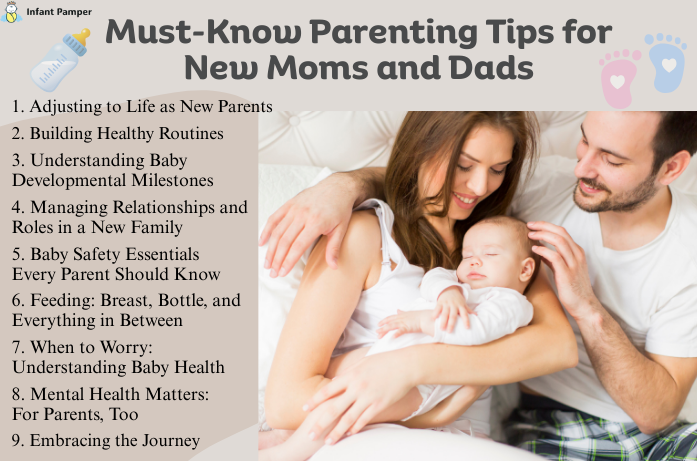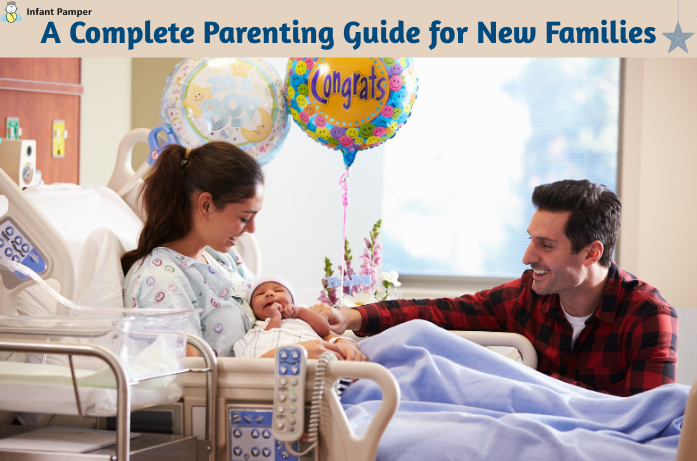By Infant Pamper Team
The experience of bringing a baby into the world is truly transformative. It’s a period of small heartbeats, intense feelings, and a completely different cadence to day-to-day existence. The early years are both tender and transformative, from learning to recognize your baby’s cries to redefining your identity as a parent. It’s a season that puts your patience to the test, strengthens your love, and reinterprets what it means to genuinely care for someone, whether you’re a blended, traditional, or single-parent family.
Whether you’re a single parent, a traditional family, or part of a blended household, becoming a parent reshapes your identity and your daily life. That’s why we’ve created this Complete Parenting Guide for New Families, to help you adjust, provide reliable knowledge, and most importantly, remind you: you are not alone on this journey.

10 – Must-Know Parenting guide for new families
1. Adjusting to Life as New Parents
Being a parent causes a major shift in a person’s mental, emotional, and physical health. It can seem like a crash course in patience and flexibility to care for a newborn. Your identity, priorities, and daily routines all shift to accommodate your baby’s needs. With the right mindset and assistance, this shift is completely normal and doable.
Practical Tips for Easing Into Parenthood:
- Lower expectations: Your house doesn’t need to be spotless right now. Focus on your baby and your own recovery. The dishes will wait.
- Sleep when the baby sleeps: Sleep deprivation is real. Sneak in naps whenever you can, even short ones.
- Get help: Let your partner, friends, or family lend a hand with meals, chores, or simply holding the baby so you can breathe.
According to the mayo clinic, postpartum recovery requires both emotional and physical strength. Feelings of sadness, anxiety, or exhaustion are common, but if they linger, it’s important to seek medical help.
2. Building Healthy Routines
One of the most helpful parenting tips for new families is to create simple, predictable routines. Babies feel safe and secure when they know what to expect.
Simple routines that work:
- Feeding schedules: Feed your baby every 2–3 hours (breastfed) or every 3–4 hours (formula-fed). Following trusted guidelines like KidsHealth’s Parent Guide can help regulate digestion and sleep.
- Sleep training basics: Use gentle cues like soft music, a dim room, or a warm bath before bedtime. Over time, your baby will connect these cues with rest.
- Bonding rituals: Reading a short story, singing a song or giving a gentle massage after a bath reinforces both routine and bonding.
👉 Tip: Be flexible. flexibility is key. Growth spurts, teething, or illness will sometimes throw routines off. That’s normal, just adjust and keep going.
3. Understanding Baby Developmental Milestones
Tracking your baby’s development helps you understand their growth without comparing them to others. Each child follows a unique timeline, and that’s completely normal.
Stages of Baby Development to Monitor:
- 0–3 Months: Your baby begins to smile in response to you, coo to get your attention, and turn his head when he hears familiar sounds.
- 4–6 Months: This stage brings exciting changes like turning over, making new sounds, and curiously reaching out toward toys or faces.
- 7–12 Months: Many babies begin to crawl, pull themselves up to stand, and may even say their first simple words like “mama” or “dada.”
The CDC reminds parents that milestones are guidelines, not deadlines. If you want a deeper month-by-month breakdown, check out our detailed guide on Baby’s First-Year Milestones and Parenting Tips for expert insights and growth tracking support.
4. Managing Relationships and Roles in a New Family
Parenting doesn’t just affect you; it affects your whole family dynamic. For couples, co-parents, and blended families, communication is key.
Parenting Tips for Family Harmony:
- Be open and honest: Talk about your feelings, whether they are ups and downs or difficult. Sharing openly helps to avoid misunderstandings and builds trust.
- Stay connected with your partner: Even five minutes of uninterrupted conversation or a quick hug with your partner can make you feel like a team again.
- Respect each role: Parents, grandparents and step-parents all bring different strengths. Respecting each role creates a stronger and more supportive family environment.
👉 In blended families, allow time for each member to adjust. Patience helps build lasting respect and love.
5: Creating a Support Network
Parenting might feel overwhelming, but you’re not meant to do it alone. Building a strong support network makes a world of difference in your emotional health and confidence as a new parent.
Ways to Build Your Support System:
- Connect with other new parents: Join local parenting groups, online forums, or community meetups where you can share experiences and advice.
- Lean on family and friends: Don’t hesitate to ask for help with meals, errands, or short breaks to rest.
- Seek professional support: Lactation consultants, pediatricians, and postpartum doulas can provide expert guidance.
- Join virtual communities: Even if you can’t leave home, online spaces like parenting groups on social media can offer encouragement and practical tips.
👉 Remember, taking care of yourself helps you take better care of your baby. Accept help, share your challenges, and celebrate small victories together.
6. Baby Safety Essentials Every Parent Should Know
Keeping your baby safe is one of the biggest responsibilities you’ll face. A few preventative steps go a long way.
Baby Safety Checklist:
- Safe sleep: Always place your baby on their back in a firm, clear crib with no pillows, blankets, or stuffed toys.
- Car seat safety: Use a rear-facing seat, properly installed. Many hospitals and fire departments offer free checks.
- Baby-proofing: Anchor furniture, cover outlets, use cabinet locks, and keep small objects out of reach.
Stay updated on product recalls through the U.S. Consumer Product Safety Commission. For more on safe sleep and home environments, the National Library of Medicine offers in-depth guidance for new parents.
7. Feeding: Breast, Bottle, and Everything in Between
Feeding can be one of the most emotional parts of parenting. Some parents breastfeed, others use formula, and many do both. What matters most is that your baby is well-fed and gaining weight.
Helpful Feeding Tips:
- Watch for hunger cues: rooting, sucking on hands, or fussiness.
- Burp your baby during and after feeds to prevent gas and fussiness.
- Track diapers, wet and dirty diapers are the best signs that your baby is getting enough milk.
If feeding becomes stressful, a certified lactation consultant or pediatrician can help find solutions tailored to your family.
8. When to Worry: Understanding Baby Health
Newborns can’t tell you what’s wrong, but their bodies give signals. Knowing what to watch for can help you act quickly.
Contact Your Pediatrician If You Notice:
- Fever above 100.4°F in babies younger than 3 months.
- Difficulty breathing, wheezing, or flaring nostrils.
- Extreme sleepiness or poor responsiveness.
- Rash with fever or swelling.
💡 Disclaimer: This article is for educational purposes only and should not replace medical advice. Always consult your doctor with concerns about your baby’s health.
9. Mental Health Matters: For Parents, Too
Your baby’s health matters, but so does yours. It’s normal to feel tired, anxious, or nervous. But when these feelings persist, it could be a sign of postpartum depression or anxiety.
Watch for Signs of Postpartum Depression or Anxiety:
- Persistent sadness or irritability.
- Difficulty sleeping, even when your baby sleeps.
- Feeling disconnected from your baby.
- Frequent panic attacks or overwhelming worry.
Organizations like Postpartum Support International offer therapy, hotlines, and local support groups to assist new parents. Parents can also find extra support through resources such as Parenting SA’s Easy Guides, which provide free, practical help for families adjusting to life with a newborn.
10. Embracing the Journey
Parenting isn’t about perfection, it’s about being present. Some days will feel joyful, others exhausting, but every smile, cuddle, and giggle is proof that you’re doing an incredible job.
- Celebrate small wins, like a quiet nap or a new milestone.
- Be kind to yourself, you’re learning, too.
- Trust your instincts, they’re often right.
- Make room for joy, laughter and play matter as much as routines.
Remember: you are doing better than you think.
FAQs for New Parents
Q1. How much should a newborn sleep?
Newborns usually sleep 14–17 hours across short stretches.
Q2. How often should I feed my baby?
Breastfed babies typically eat every 2–3 hours, while formula-fed babies feed every 3–4 hours.
Q3. When should I start solid foods?
Most babies are ready around 6 months, but always confirm with your pediatrician.
Q4. Is it normal to feel overwhelmed as a new parent?
Yes, adjusting takes time. If the stress feels too heavy, lean on your support system or professionals.
Final Thoughts
Parenting is a journey filled with love, learning, and countless little moments that shape both you and your child. There is no one “perfect way” to do it – every family’s path is different. The most important thing is to stay present, be patient, and trust your instincts as you grow alongside your child.
At Infant Pamper, we’re here to support you with simple, reliable, and parent-friendly resources.
For more helpful newborn care tips and parenting guides, explore our resources at infant pamper




